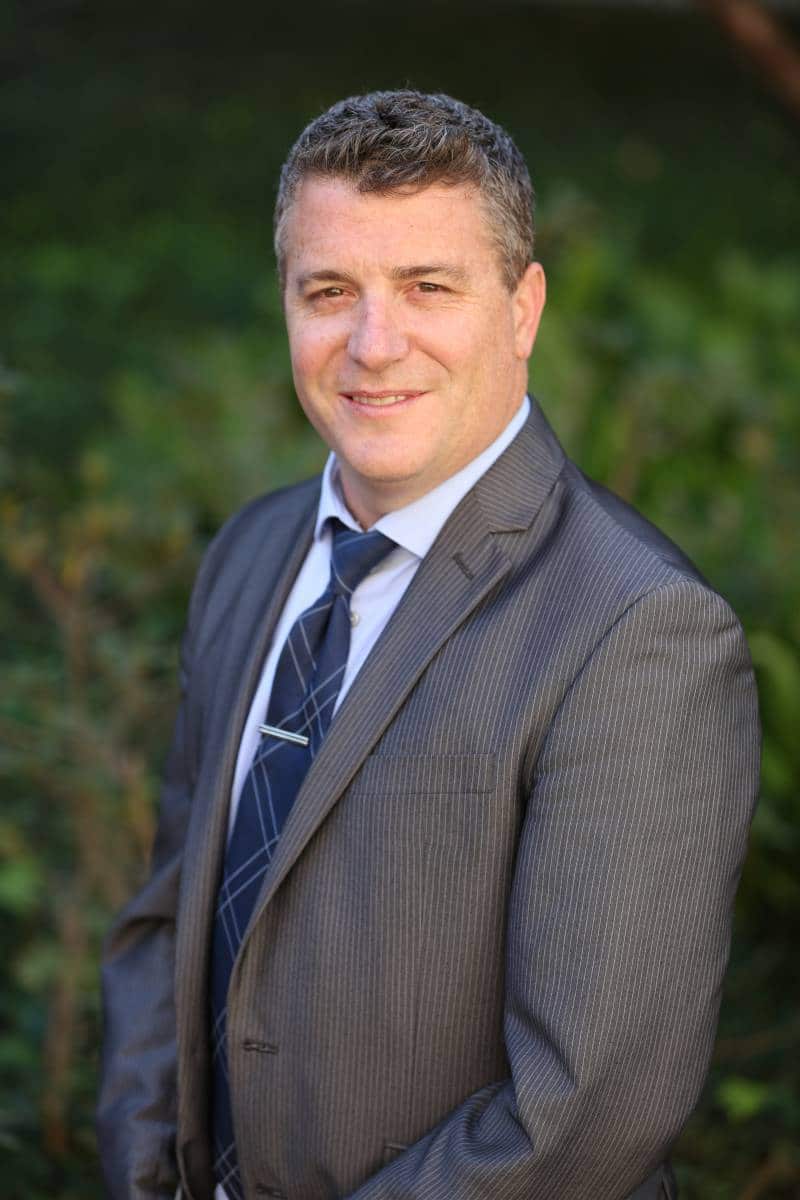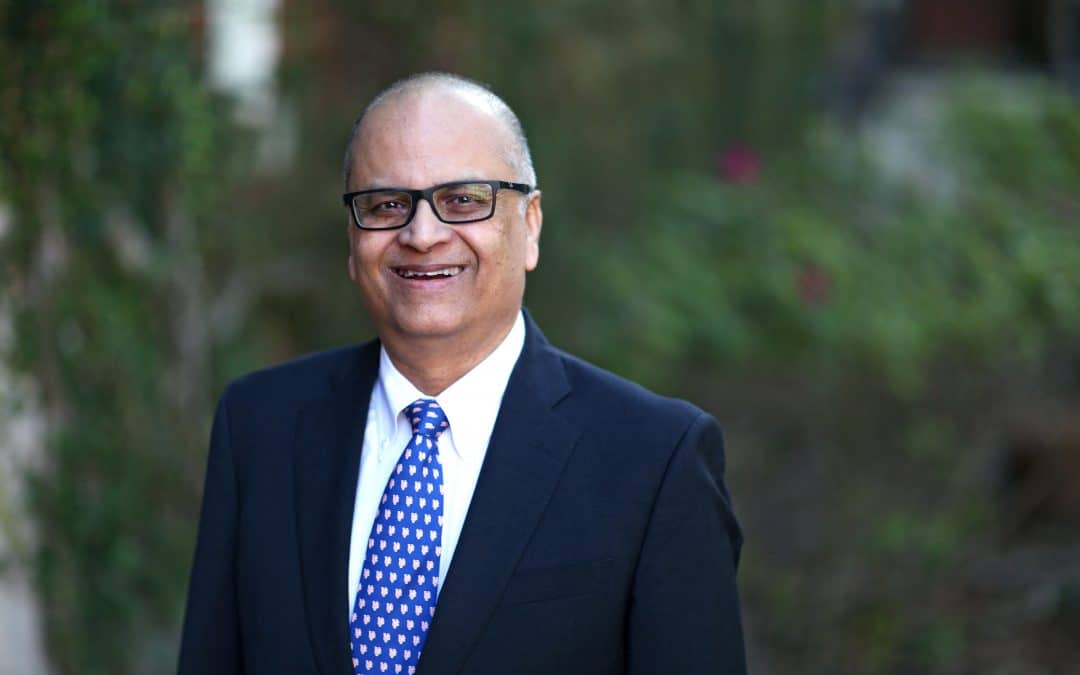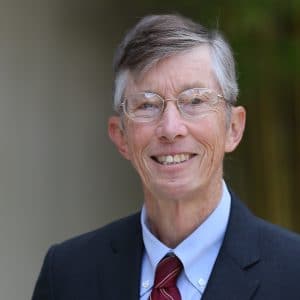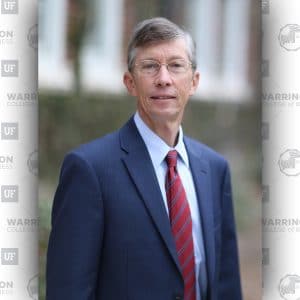We Are Warrington | Will data and smart technology turn against us?
Dean Saby Mitra joins host Andy Lord to talk about analytics and AI, how COVID-19 will affect higher education, road biking in Gainesville and more.

Andy Lord
Andy Lord: What do you think of this weather? This is the real Gainesville weather here.
Saby Mitra: I don’t think so.
Lord: Well, this is the good Gainesville weather, it’s not the real Gainesville weather.
Mitra: July and August is probably more real Gainesville weather.
Lord: We Are Warrington, is a new podcast that helps young business leaders discover what is possible by highlighting stories from the Warrington College of Business Community about the University of Florida experience, business industry insights, innovative research and more. I’m your host, Andy Lord.
Today we are speaking with Dr. Saby Mitra, Dean of the University of Florida Warrington College of Business. Saby began his tenure as Dean this August and comes to us from Georgia Tech. As Dean Saby is responsible for leading Warrington strategy and vision, championing its fundraising efforts in managing budget and personnel. As a researcher and educator, Saby’s expertise is at the intersection of business, analytics and information technology. He received his PhD from the University of Iowa and his bachelor’s degree in mechanical engineering from the Indian Institute of Technology. Today we’re talking with Saby about the future of business education and the impact of analytics and AI on the business world.
Dr. Mitra, Dean Mitra, Saby, welcome. It’s been a couple of months since you started as Dean of the Warrington College of Business. How’s it going so far?
Mitra: Andy, very good. It’s been great, but very, very hectic. You know, COVID has created some special challenges for us, as it has for many other units on campus. You may know that in Spring 2021, UF will be offering as many face-to-face sections as we did in Spring 2020. But with social distancing, our classroom capacities are obviously significantly reduced.
And so, for every face-to-face section we have to offer an online section that will accommodate a much larger number of students. This requires every classroom to be equipped with the right technology and for faculty to adjust their teaching approaches. It’s really complicated, but the team came together and implemented a viable plan that I think will serve our students very well and will keep everyone safe at the same time. I’m really so proud of the hard work everyone has put in, but it has been very hectic, Andy.
Lord: Yeah, I believe so. I haven’t even got to shake your hand yet. I think that’s many of us, we haven’t physically seen you. I mean, I do these Zoom meetings with you, which is great to get to know you and all that stuff, but I think we’re all looking forward to the day where we could get back together and interact and have events and all the great things that I know Warrington has done in the past.
And as we look towards the future, I’m definitely excited to get us all back here together. When you saw Warrington was looking for a new Dean, what was it that drew you to apply? What about Warrington got you really excited about joining us?
Mitra: As you know, I came here this fall after 27 years in Georgia Tech. The move to Gainesville was a no-brainer for me. I always knew about the stellar academic reputation of Warrington faculty. I also know that being the flagship university and the third most popular state, Warrington has great students. And I probably couldn’t get in here as a student anymore, so why not try coming here as a dean. In the last few months since I’ve been here, I’ve been just amazed by the dedicated staff we have in the college. It’s not something that you can readily see from outside. And I’ve been blown away by the commitment of our alumni to Warrington and UF.
Lord: I’ve also asked a lot of people, you know, what they think of Gainesville favorite restaurants or spaces around Gainesville? You’ve been here three months, what do you think of Gainesville so far?
Mitra: It’s different from what I expected.
Lord: Yeah, I know it’s different than Atlanta, that’s for sure.
Mitra: Yeah, I do feel that Gainesville is obviously very different from what I’ve been used to. I grew up in a city which has, I believe 20 million people. And in the U.S., most of my time I’ve lived in a city that has five or six million people. I don’t remember the population of Atlanta but it’s a very large city. And although I lived in the suburbs, I would drive to downtown every day.
So, I was very, and Georgia Tech was located right in the middle of, it’s very near downtown. So, I was very familiar with that environment. Gainesville is very different in a lot of ways, some positive. So, for example, I don’t have to face the traffic that I did in Atlanta. It would take me, sometimes half an hour to get out of the parking lot and into the interstate. And we were located right next to the interstate. So that’s a real positive aspect.
Lord: Yeah, it only takes 20 minutes here now, so you’ll be alright to get out of the parking lot.
Mitra: Right, right. Yeah, though I have been a little surprised by the amount of traffic that there is in Gainesville. I hadn’t expected that.
Lord: Right.
Mitra: And then in terms of my road biking, I was always too scared to ride my road bike in Atlanta, I think it’s going to be much easier here. I’ve attempted a few rides out here mainly on, near where I live. But it’s much easier to ride here, so I’m really looking forward to that. And then it’s just a slower pace of life which I truly enjoy. Because in Atlanta was much more hectic, even the longer commute made it more hectic. I feel much calmer in Gainesville. So, lots of positives as well.
Lord: You know, you just mentioned our amazing students. You know, we have great students here at the Warrington College of Business. And many of our undergraduate students go on to get a master’s degree. A strong percentage are actually in our combined degree programs in which they’re taking their undergraduate and their graduate classes at the same time. What do you think is the benefit of pursuing a master’s degree, especially in today’s world?
Mitra: Andy, there are many benefits. First, it’s about giving yourself an edge in the marketplace. Being at Warrington itself gives you an edge, but a master’s degree helps to differentiate you from the many undergraduates out there trying to compete in the workforce. And if you start your career with an advantage, it sort of grows over time. With some effort that advantage you start with, puts you in a better position for the next promotion and the next, and it builds over time.
With the combined degree, you don’t have to take time off from work later to complete a master’s degree. This makes it economically a much better proposition than coming back later to complete your master’s. And third, you get deeper expertise in a very specific area, whether it’s business analytics, finance, marketing or international business that makes you much more effective in your job and help you differentiate yourself from the many other smart people out there in the workforce. You really are ready from day one.
Lord: Fantastic, thank you. I wanna transition to the future of business education. What do you see on the horizon? What will students need to be learning about as we progress forward? What are some of the important topics you think will play a larger role in the future of business education?
Mitra: From a curriculum standpoint, Andy, there is a need I think to refresh the curriculum in many business schools with a greater emphasis on technology and analytics. And I’m not really talking about technology light or analytics light courses. Although that may be necessary to bring some students up to speed. But it’s about technology or analytics, contextualize to domains such as finance, accounting, and marketing.
That’s where most companies are struggling. How do we use the technology to improve business outcomes? What are the things we need to do around technology to make it successful? Such as marketing, justify investments in technology, develop a business case, change processes, transform job functions. If we can create business leaders who can leverage technology and analytics for business advantage, there will be a demand for business school education from students, and demand from employers for hiring such students. But we also cannot forget the basics.
You know, students come to a business program, whether it’s an MBA or specialized masters, to really transform their careers. And I think business schools have to think carefully about how we can have that transformational impact. How can we give students meaningful experiences to develop their leadership skills? Now, how can we provide meaningful entrepreneurship opportunities or even opportunities to work on real projects with real companies? How can we improve their communication, interviewing, and other skills? How can we make them ethical leaders? I think some of this may come from curricular elements, but also increasingly from program elements which are outside the classroom.
That’s where our focus will be going forward, giving students meaningful experiences outside of the classroom to make them better leaders whether they are in our MBA or in our specialized master’s programs.
Lord: COVID 19 has changed a lot of our world. It’s obviously changed a lot of the way we’re all operating our business practices right now. What are some of the lasting effects of the pandemic you see on business education? Is there any changes that you could foresee or anything that you’d like to share with us on that topic?
Mitra: Well, most of us have realized that much of the work we do can actually be done very effectively online and remotely. I think that’s one of the profound learnings from our COVID experience. And I think that’s going to stick. So, students have realized that online education is not only possible, it has many benefits in terms of reach, flexibility, convenience. If you didn’t quite follow a complicated accounting concept for example, you can watch it again and again until you do understand it. It’s hard to get a CEO to come to class in Gainesville, but she can join through Zoom.
Here in Warrington, we have many years of experience with online classes and we know how to do it well. But as I mentioned before, a business school education is more than just the classroom. It’s also about networking, corporate projects, case competitions, peer mentoring, alumni mentoring, student clubs, career coaching, leadership programs. And I think winners in the post-COVID, next generation of online programs, will be those that can do all the non-classroom aspects really well in an online setting. It’s not easy to do. I really intend to make Warrington a leader in both face-to-face and online education.
Lord: That is great. You know, it’s amazing you bring that up, and we definitely were one of the first to the game whenever you’re talking about online education. Spending a lot of my tenure here in the MBA program with our online program, just the popularity, the flexibility, the ability our students to access it from all over the globe has been quite impactful. And it’s great to see that we’re actually moving into that space in our specialized master’s degree programs where a few of those options are already being offered online prior to the pandemic.
So, I know we’re ready and I know our faculty is doing a great job operating in that space. So, thanks Saby. We’re gonna take a quick break right now and we’ll be back with more from the Warrington College of Business. Dean Saby Mitra, in a minute.
The University of Florida’s Master of Science in Information Systems and Operations Management program can prepare you to thrive in the age of analytics, artificial intelligence and machine learning. As technology advancements changed the business world as we know it daily, the program’s curriculum ensures you are ready to discover effective methods and innovative strategies that help companies take the next big step. With program tracks available in business analytics, data science, information technology, and supply chain management, now’s the time for you to take the first step towards an innovative career. Learn more about earning your master’s in information systems and operations management by visiting the link in the podcast episode description, or at www.warrington.ufl.edu/podcast/episodefour. Again, it’s www.warrington.ufl.edu/podcast/episodefour.
Welcome back to We Are Warrington. I’m chatting with Warrington College of Business Dean, Dr. Saby Mitra. Saby, I wanna get back into what we started talking about right before the break, analytics and AI. I think when people hear the word analytics and AI, they might think of extreme stories like movies we have seen. “2001 Space Odyssey” or “The Terminator”, where data and smart technology turn against us, or actually ends up hurting us in some sort of way. How should we approach learning about analytics and AI? Can you demystify the concept and intent for our listeners?
Mitra: You know, those are funny examples that you’ve brought up.
Lord: I’m trying to be funny.
Mitra: Let me make a couple of points here. First, I think the real gap that companies face today is not in what I call the production of analytics and AI, but in the consumption of analytics and AI. In other words, the real opportunity for most businesses is not in the technology or the development of the technology itself, but in using that technology to make a business difference.
For example, to improve customer service or to increase revenue or profits or to reduce costs, that’s where the real gap is. How do I use this to make a business difference? So, where are the opportunities for companies to use AI and analytics to make a business difference? In that a broad level, it comes back to the role of information technology and computers to automate and informate. For example, you can use AI and analytics to automate certain tasks that have traditionally been done by humans. To give you a few examples, when you apply for a loan, the loan approval can be done by an automated agent in perhaps many, but not all cases using various pieces of data that the automated agent might have access to.
And as a consumer, you will receive the approval in seconds rather than weeks and months. And that would provide significant advantage to a company that employs such a technology. Or many of you are familiar with the facial recognition software in airports that can automate and speed up the check-in process. So that’s one aspect of AI which is automating what humans have done before. The other aspect of AI and analytics for me is informate.
Using AI and analytics to augment the work typically done by humans so that humans can make better decisions. For example, you can use AI and analytics to sift through large amounts of e-commerce data and provide recommendations on which customers to target. Or use AI and analytics to read a scan and alert a physician about abnormalities in the scan. The focus here is on augmenting human work and helping them make better decisions. That makes human work more productive. And that’s the informate aspect of AI and analytics. And you know for me, we often use the word AI and analytics together.
It’s really hard for me to differentiate between AI and analytics. But AI is perhaps more aligned to the automate aspect I talked about. And analytics is more aligned to the informate aspect I talked about. Even more important, even in the few examples that I mentioned, they bring up many ethical and managerial issues. How can we make sure that the algorithm for making the loan decisions is not biased? How can we protect patient privacy in the medical example that I gave? Or how can we train our workforce differently so that they’re not left behind and they can take advantage of AI and analytics? Just to mention a few ethical and managerial issues that are, you know, top of mind for many senior managers today.
Lord: Gotcha. So, when I get denied for a loan, a computer’s doing it, is what you’re saying, basically telling me?
Mitra: Well, you’ll get it in seven seconds. There is some advantage.
Lord: I like it. Now, I had noticed that it goes rather quickly. To reference something you just said prior, I think people might be surprised to hear that analytics and AI have been integrated in what we do here at the Warrington College of Business. You mentioned management, accounting and marketing a little bit earlier. Can you give some examples of what it looks like in those areas?
Mitra: Sure. So, it’s no surprise that business today produces massive amounts of data. You know, if you take the example of a retail firm that generates large amounts of consumer product, supply chain market data. And if you take financial services firms like the one I mentioned before, they generate large amounts of transaction and consumer data. And if you take a manufacturing firm completely in a different industry, they generate large volumes of sensor data. So as a result of this large amounts of data that is typically available, faculty research in every business discipline has been transformed in the last decade by the availability of this data.
And I think Warrington faculty has been at the forefront of this transformation. Now, many faculty in our ISOM and marketing departments have focused on using large volumes of e-commerce and clickstream data to better understand consumer behavior. Do better online reviews, lead to better product scales. Are consumers more likely to find reviews with certain characteristics more helpful when they search for a new product? There’s also a long tradition of research in finance, using stock market data that goes back for many decades. But I think that research in recent years has been expanded to include data from other sources. And some of our accounting faculty are using AI based methods to analyze corporate documents like financial statements reports, announcements that companies make to really better understand drivers of corporate performance. So those are just a few examples from our various faculty groups.
One of the things we are really working on today is our curriculum. And changing our curriculum to bring this faculty expertise in AI and analytics that has remained more on the research side into the classroom. So that our students are better equipped with the latest tools.
Lord: Excellent, really like to hear that. Something I like to ask my guests is, personally, what is something you do to stay motivated? And what are you currently doing to invest in yourself? I wanna inspire our listeners and hear a little nugget of information they might pick up from folks that I’m speaking with. But, again, you know something that keeps you motivated maybe something that you’re doing to invest in yourself.
Mitra: That’s a great question. Even though my role is mainly administrative at University of Florida, I’m still a faculty member. And I try to go back to the reasons I became a faculty member, which is to do research and to teach. And so even though my role is primarily administrative, and if you look at my calendar today you will see Zoom meetings pretty much every hour of the day.
I still do try to keep up on my research as much as I can. I think it keeps me fresh in my thinking and up to date on current business environment and thinking. I think it also breaks the monotony of a purely administrative role. And I like writing. And usually, I take on the writing part of the research while my co-authors often do the more detailed analysis. I also like the challenge of explaining complex concepts in a clear way. And so, I love to be in the classroom. And while I’m not teaching right now, it would be good to be with students in the future. That’s really why I became a professor, to teach and to do research. And I hope to continue that even as Dean.
And then it’s also important to take some time to recharge. If you’re all about work, I think your work will suffer, and you will be much more productive if you have a few things that you do in your life that you really enjoy doing. So, for me, it’s reading, I’m into cooking, I love to road bike and be outside. And those are things I try to continue as much as possible after a busy day or during the weekends so that I keep myself fresh.
Lord: I love it. Yeah, I ride about a hundred miles a day myself, you know, on my road bike. Nah, I’m just kidding.
Mitra: I don’t remember the last time I rode a hundred miles.
Lord: I love it. Saby, thanks for being so open. You know, something I will tell you from behind the scenes is, all of us have mentioned that about you. Your level of kindness, your candidness, your just ability to meet with all of us. Like you’ve said, you have packed Zoom calendars and many of us have tried to get on your schedule to speak with you and get to know you. So, again, I appreciate you spending this time with me today. It’s been fantastic. You’ve shared some incredible insights with our group here and our listeners. So, I’m very excited for this episode to be released.
Mitra: Thank you, Andy.
Lord: You definitely can keep up with more from Dean Saby Mitra in the Warrington Newsroom. So please keep checking out all the stuff that we’re putting out. And to our listeners out there, stay motivated, stay kind, and we will see you all next time.




